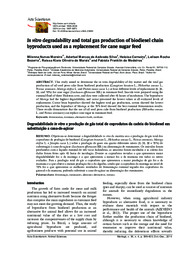In vitro degradability and total gas production of biodiesel chain byproducts used as a replacement for cane sugar feed.
In vitro degradability and total gas production of biodiesel chain byproducts used as a replacement for cane sugar feed.
Author(s): MOREIRA, M. N.; SILVA, A. M. de A.; CARNEIRO, H.; BEZERRA, L. R.; MORAIS, R. K. O. de; MEDEIROS, F. F. de
Summary: This study aimed to determine the in vitro degradability of dry matter and the total gas production of oil seed press cake from biodiesel production (Gossypium hirsutum L., Helianthus annuus L., Ricinus communis, Moringa oleífera L. and Pinhão manso curcas L.) at four different levels of replacement (0, 30, 50, and 70%) for cane sugar (Saccharum officinarum RB.) in ruminant feed. Inocula were prepared using the ruminal fluid of three Holstein cows, and data were collected after 48 hours of incubation. The byproducts of Moringa had the highest degradability, and castor presented the lowest values at all evaluated levels of replacement. Castor bean byproduct showed the highest total gas production, cotton showed the lowest production, and the byproduct of Moringa at the 70% level showed the best ruminal fermentation results. These results demonstrate that the use of oil seed press cake from biodiesel production (Helianthus annuus L. and Ricinus communis) can replace cane sugar in ruminant feed.
Publication year: 2014
Types of publication: Journal article
Unit: Embrapa Dairy Cattle
Keywords: Alternative foods, Ruminant, fermentation, methane
Observation
Some of Embrapa's publications are published as ePub files. To read them, use or download one of the following free software options to your computer or mobile device. Android: Google Play Books; IOS: iBooks; Windows and Linux: Calibre.
Access other publications
Access the Agricultural Research Database (BDPA) to consult Embrapa's full library collection and records.
Visit Embrapa Bookstore to purchase books and other publications sold by Embrapa.

